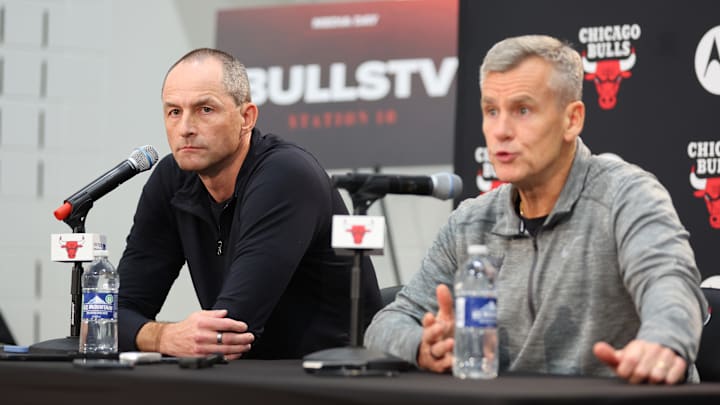The 2025 NBA Finals are the perfect example of how two teams stuck in the lottery for three straight years from 2021 to 2023 completed successful rebuilds by committing to a long-term vision and making bold moves. The Indiana Pacers and Oklahoma City Thunder took two totally different pathways to Finals contention, but they both did something the Bulls haven’t been able to: create a clear plan and stick to it.
How the 2025 NBA Finalists rose to the top
Oklahoma City’s rebuild began when they traded Paul George and Russell Westbrook to the Clippers and Rockets, respectively. In return, they landed Shai Gilgeous-Alexander and a haul of seven first-round picks, two of which turned into Jalen Williams and Cason Wallace. Additionally, they selected Josh Giddey and Chet Holmgren with their own selections as a team at the bottom of the standings. This alone got them to the second round of the playoffs, but it was the 2024 offseason that really pushed them into Finals territory. They signed Isaiah Hartenstein in free agency and traded for Alex Caruso from well… the Bulls.
The Pacers took a slightly different approach, but made a similar franchise-altering move when they flipped Domantas Sabonis to the Sacramento Kings for Tyrese Haliburton. Indiana had been stuck in mediocrity for years, but Haliburton gave them a legitimate young star to build around. They surrounded him with a versatile, modern roster focused on spacing and defense, adding Pascal Siakam, Aaron Nesmith, and Obi Toppin via trade. They also nailed the draft, selecting Bennedict Mathurin, Andrew Nembhard, Jarace Walker, and Ben Sheppard.
So what do these teams have in common? They rebuilt the roster to fit the standards of the modern NBA, embracing youth, pace, shooting, and versatility. Most importantly, they picked a direction. Even though OKC and Indiana built differently, they both decided to tear down their rosters and bottom out by moving their star players at the right time, and trusted the process.
That’s the part the Chicago Bulls, specifically Arturas Karnisovas, has yet to figure out.
Where Arturas Karnisovas went wrong with the Bulls
By the time Karnisovas decided to trade Zach LaVine and DeMar DeRozan, their value had already dropped. The front office's ability to sell Nikola Vucevic high came and went, and now the Bulls are left with an awkward mix of aging veterans and youth development.
This makes you think. Does he explore trading Coby White, who is coming off a breakout season and is most likely at his peak value, or does he hold onto the only player the Bulls have shown any positive development with since Jimmy Butler?
That conflict, and the hesitation behind it, is exactly the issue.
Unlike the Thunder and Pacers, the Bulls have refused to commit to anything. The Vucevic trade was a win-now move that cost them long-term assets (Franz Wagner and Jett Howard). The DeRozan signing worked for a short stint, until Lonzo Ball’s chronic injuries left the team without a true point guard. Instead of bringing about change, the front office sat on their hands and hoped the team would eventually work out. This has stuck them as being too good to tank, but nowhere near good enough to contend for the past five seasons.
How Karnisovas can learn from the best
If Karnisovas wants to make the Bulls relevant again, he must make difficult decisions. Right now, it appears as if he is running the team like he's scared to upset ownership. He is stuck between trying to pay for players that would allow them to actually compete and not being able to spend enough to actually do it. He cannot enter the luxury tax, because the Reinsdorf's have only allowed any front office to do that once in the team's history. He cannot fully rebuild either, because that would hurt the Reinsdorf’s short-term profitability.
The Bulls don’t need to replicate the Thunder or Pacers exactly, but they do need to operate with a clear vision. That might mean tearing the team down and starting from the ground up. It might mean prioritizing younger players like Coby White, Josh Giddey, and Matas Buzelis over Lonzo Ball and Nikola Vucevic. However, it absolutely means accumulating picks, developing talent, and thinking long term, instead of settling for “just good enough” every season.
